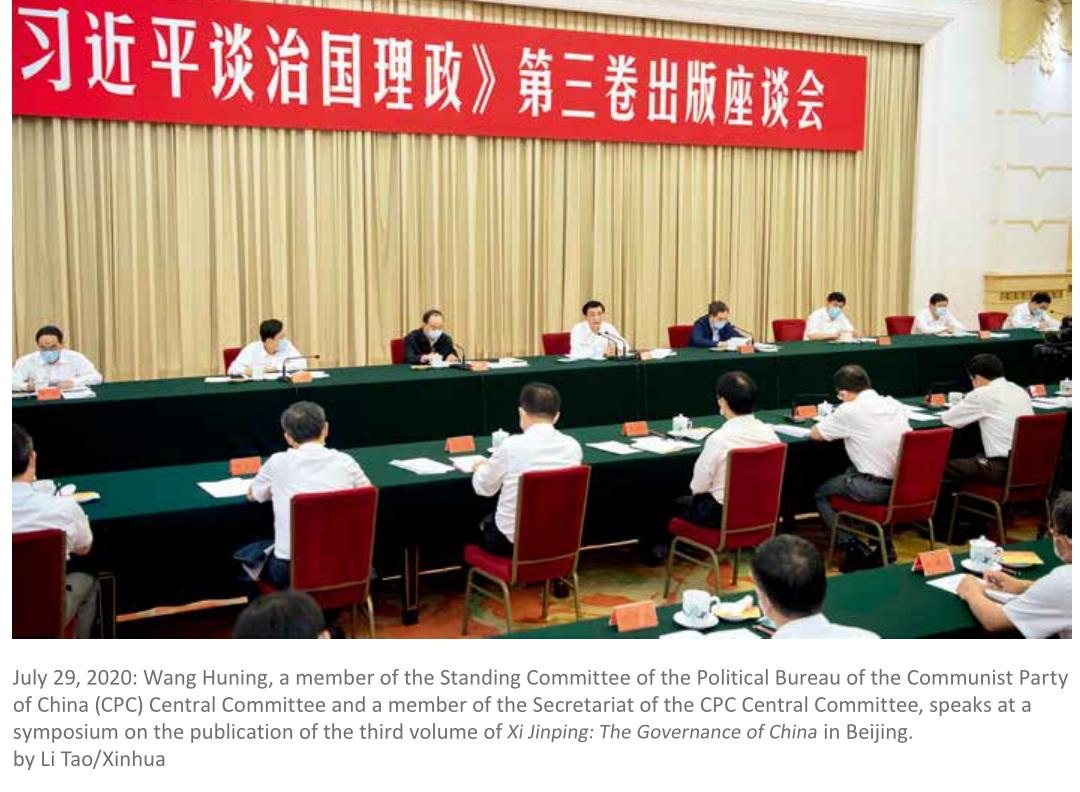A Blueprint for the China of Tomorrow
2020-09-08byZhengChangzhong
by Zheng Changzhong
Recently, the third volume of Xi Jinping: The Governance of China has been published in both Chinese and English.
The new volume compiled 92 articles including speeches, conversations, instructions, and letters composed by Chinese President Xi Jinping, also general secretary of the Communist Party of China(CPC) Central Committee, between October 18, 2017 and January 13, 2020. What new enlightenment does this volume bring? What distinguishes this book from previous installments? To fully understand the work, it should be read with proper knowledge of the historical context of the development of modern Chinese civilization.
More than a century ago, Chinas traditional civilization began to be severely impacted by the waves of modernization.
In the process of building modern civilization in China, the nation chose to reorganize the country and society under the leadership of a political party, and ultimately the CPC accepted the historical mission.
Attempting to “catch up” to solve the disconnection between the scattered state of traditional society and growing demands for orderly construction of a modernized nation, the Peoples Republic of China established a planned economic system and unit-based social system in the early days after its founding. Thanks to the hard work of millions over more than 20 years, the tasks for the basic stage of socialist modernization were completed.
To promote the sustainable development of Chinas modernization, the Third Plenary Session of the 11th CPC Central Committee in 1978 decided to implement a reform and opening-up policy. In 1992, the 14th CPC National Congress made the decision to establish a socialist market economic system, marking the establishment of modern market in China.
In 1997, the 15th CPC National Congress announced intentions to build a socialist country under the rule of law, signifying the comprehensive development of modern country.
In 2002, the 16th CPC National Congress introduced the “Three Represents,” articulating the CPCs comprehensive promotion of theoretical innovation and development in accordance with the requirements of market economy and rule of law.
In 2007, the 17th CPC National Congress proposed building a harmonious socialist society, marking the beginning of modern society in China.
By the 18th CPC National Congress in 2012, the major elements of building a modern civilization such as a modern political party, a modern country, a modern market, and modern society were basically completed in China.
However, development of these elements has not been enough, and construction of modern Chinese civilization still faces two problems. One is insufficient development of internal functions, and the other is a lack of internal integration. Development of Chinas modern civilization has reached a point in which it needs to leap from the stage of cultivating major elements to the stage of sketching the overall picture.
In this context, the CPC held its 18th National Congress and elected the Party Central Committee with Xi Jinping at its core.
To accelerate the shaping of the overall format of Chinas modern civilization, the 18th CPC Central Committee convened its Third Plenary Session and proposed comprehensively deepening reforms based on top-level design, improving and developing socialism with Chinese characteristics, and promoting the modernization of national governance system and governance capacity.
Subsequently, the Fourth, Fifth, and Sixth Plenary Sessions of the 18th CPC Central Committee respectively arranged for comprehensively promoting law-based governance, completing the building of a moderately prosperous society in all respects, and comprehensively enforcing strict Party self-governance.
The first and second volumes of Xi Jinping: The Governance of China are compilations of the major speeches and concepts of General Secretary Xi to guide the advance of modern Chinese civilization after the 18th CPC National Congress.
Since the 18th CPC National Congress, the CPC Central Committee with Xi Jinping at the core has comprehensively deepened reforms. It has promoted more flexible functionality of the Party, the country, society, and the market while honing relationships between major elements in accordance with the needs of modernization.
After all this work, it remains necessary to sketch a clear blueprint for Chinas modern civilization and comprehensively promote its construction. In this context, the CPC held its 19th National Congress in 2017.
In the report delivered at the opening session of the 19th CPC National Congress, General Secretary Xi announced that socialism with Chinese characteristics has entered a new era and that the principal contradiction facing Chinese society has evolved to the contradiction between imbalanced and inadequate development and the peoples ever-growing needs for a better life.
The report cited Xi Jinping Thought on Socialism with Chinese Characteristics for a New Era and offered basic strategies while clarifying strategic arrangements to secure decisive victory in building a moderately prosperous society in all respects and move on to all-out efforts to build a great modern socialist country.
The report represents comprehensive arrangements for building socialism with Chinese characteristics in the new era as well as a systematic design outlining the format of Chinas modern civilization.
The third volume of Xi Jinping: The Governance of China contains a compilation of Xis report at the 19th CPC National Congress and other subsequent spoken and written works. The report tops the table of contents, followed by 19 sections arranged by topic to interpret the guiding principles of the 19th CPC National Congress. The content of specific articles shows that this interpretation is not static, but dynamic, forming a multi-layer matrix arrangement with both time and content dimensions.
In fact, the 19 sections basically explain and interpret the guiding principles of the 19th CPC National Congress across three aspects: carrying out proposals made at the congress, implementing the blueprint designed at the congress, and advancing work in practice.
The third volume not only interprets and elaborates the guiding principles of the 19th CPC National Congress, but also further enriches and deepens the connotations of those guiding principles through practical innovation. Moreover, it collects the new decisions, ideas, and policies put forward by Xi during the process of building socialism with Chinese characteristics.
The book represents not only important“instructions” for building socialism with Chinese characteristics in the new era, but also a blueprint for tomorrows Chinese civilization.